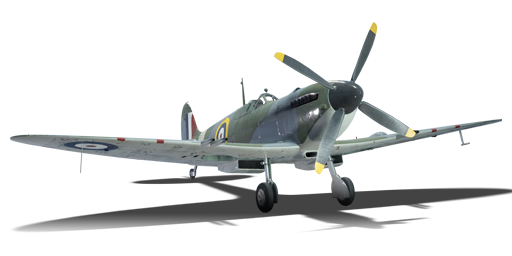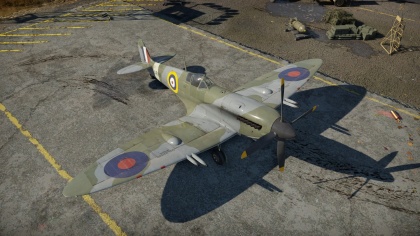Difference between revisions of "Spitfire F Mk IXc"
StingerRPG (talk | contribs) m (Touched on Pros&Cons, added numbers to flight performance and weaponry modules) (Tag: Visual edit) |
(Edits.) |
||
| Line 38: | Line 38: | ||
! RB | ! RB | ||
|- | |- | ||
| − | | 618 || 602 || | + | | 618 || 602 || {{Specs|ceiling}} || 18.1 || 18.8 || 15.3 || 15.3 || 380 |
|- | |- | ||
! colspan="8" | ''Upgraded'' | ! colspan="8" | ''Upgraded'' | ||
| Line 55: | Line 55: | ||
! RB | ! RB | ||
|- | |- | ||
| − | | 669 ||642|| | + | | 669 || 642 || {{Specs|ceiling}} || 16.3 || 17.2 || 23.7 || 18.9 || 380 |
|- | |- | ||
|} | |} | ||
| Line 136: | Line 136: | ||
<!--Examine the survivability of the aircraft. Note how vulnerable the structure is and how secure the pilot is, whether the fuel tanks are armoured, etc. Describe the armour, if there is any, and also mention the vulnerability of other critical aircraft systems.--> | <!--Examine the survivability of the aircraft. Note how vulnerable the structure is and how secure the pilot is, whether the fuel tanks are armoured, etc. Describe the armour, if there is any, and also mention the vulnerability of other critical aircraft systems.--> | ||
| − | * 38 mm Bulletproof glass in front of pilot | + | * 38 mm Bulletproof glass in front of the pilot |
* 3 mm Steel plate on top of fuel tanks | * 3 mm Steel plate on top of fuel tanks | ||
* 4 mm Steel plate on pilot's seat. Behind pilot is another 6-7 mm steel plate | * 4 mm Steel plate on pilot's seat. Behind pilot is another 6-7 mm steel plate | ||
| Line 142: | Line 142: | ||
* Critical components located at the front of aircraft (fuel, pilot, engine, controls) | * Critical components located at the front of aircraft (fuel, pilot, engine, controls) | ||
| − | * Liquid cooling system at wing root | + | * Liquid cooling system at the wing root |
== Armaments == | == Armaments == | ||
| Line 198: | Line 198: | ||
| Radiator | | Radiator | ||
| | | | ||
| − | |Offensive 20mm | + | | Offensive 20mm |
|- | |- | ||
| II | | II | ||
| Line 204: | Line 204: | ||
| Compressor | | Compressor | ||
| Airframe | | Airframe | ||
| − | |New 20mm cannons | + | | New 20mm cannons |
| | | | ||
|- | |- | ||
| Line 211: | Line 211: | ||
| Engine | | Engine | ||
| | | | ||
| − | |Mk.II Year 1942 | + | | Mk.II Year 1942 |
| − | |SBC mark 25 | + | | SBC mark 25 |
|- | |- | ||
| IV | | IV | ||
| Line 218: | Line 218: | ||
| Engine Injection | | Engine Injection | ||
| Cover | | Cover | ||
| − | |Mk.II Year 1943 | + | | Mk.II Year 1943 |
|- | |- | ||
|} | |} | ||
| Line 230: | Line 230: | ||
* Ammunition pool boost to 120 rounds per gun compared to the 60 rounds of predecessors | * Ammunition pool boost to 120 rounds per gun compared to the 60 rounds of predecessors | ||
* Good low altitude performance | * Good low altitude performance | ||
| − | * Highly | + | * Highly manoeuvrable and excellent roll rate |
* Good climb rate | * Good climb rate | ||
* Very good at Boom and Zoom | * Very good at Boom and Zoom | ||
| − | * Engine will not shut off performing a quick Negative G | + | * Engine (fuel injected) will not shut off performing a quick Negative G manoeuvre unlike the Spitfires before it (RB/SB) |
'''Cons:''' | '''Cons:''' | ||
| Line 245: | Line 245: | ||
* Light airframe, which can't withstand a lot of punishment | * Light airframe, which can't withstand a lot of punishment | ||
* Suffers heavily from compression in steep dives | * Suffers heavily from compression in steep dives | ||
| − | * A leak in cooling system can cripple the engine in minutes | + | * A leak in the cooling system can cripple the engine in minutes |
== History == | == History == | ||
Revision as of 17:10, 15 July 2019
Contents
| This page is about the British aircraft Spitfire F Mk IXc. For other vehicles of the same family, see Spitfire (Family). |
Description
The Spitfire F Mk IXc is a rank III gift British fighter
with a battle rating of 5.0 (AB) and 4.7 (RB/SB). This aircraft was introduced in Update 1.77 "Advancing Storm" as a reward during Royal Air Force centenary.
General info
Flight Performance
Describe how the aircraft behaves in the air. Speed, manoeuvrability, acceleration and allowable loads - these are the most important characteristics of the vehicle.
| Characteristics | |||||||
|---|---|---|---|---|---|---|---|
| Stock | |||||||
| Max Speed (km/h at ?,000 m) |
Max altitude (meters) |
Turn time (seconds) |
Rate of climb (meters/second) |
Take-off run (meters) | |||
| AB | RB | AB | RB | AB | RB | ||
| 618 | 602 | 11500 | 18.1 | 18.8 | 15.3 | 15.3 | 380 |
| Upgraded | |||||||
| Max Speed (km/h at ?,000 m) |
Max altitude (meters) | Turn time (seconds) | Rate of climb (meters/second) |
Take-off run (meters) | |||
| AB | RB | AB | RB | AB | RB | ||
| 669 | 642 | 11500 | 16.3 | 17.2 | 23.7 | 18.9 | 380 |
Details
| Features | ||||
|---|---|---|---|---|
| Combat flap | Take-off flap | Landing flap | Air brakes | Arrestor gear |
| X | X | ✓ | X | X |
| Limits | ||||
|---|---|---|---|---|
| Wing-break speed (km/h) |
Gear limit (km/h) |
Combat flap (km/h) |
Max Static G | |
| + | - | |||
| 774 | 270 | N/A | ~12 | ~7 |
| Optimal velocities | |||
|---|---|---|---|
| Ailerons (km/h) |
Rudder (km/h) |
Elevators (km/h) |
Radiator (km/h) |
| < 321 | < 400 | < 450 | > 250 |
| Compressor (RB/SB) | ||
|---|---|---|
| Setting 1 | ||
| Optimal altitude | 100% Engine power | WEP Engine power |
| 4,200 m | 1,330 hp | 1,543 hp |
| Setting 2 | ||
| Optimal altitude | 100% Engine power | WEP Engine power |
| 7,500 m | 1,150 hp | 1,334 hp |
Survivability and armour
- 38 mm Bulletproof glass in front of the pilot
- 3 mm Steel plate on top of fuel tanks
- 4 mm Steel plate on pilot's seat. Behind pilot is another 6-7 mm steel plate
- 3 mm Steel plates around ammunition
- Critical components located at the front of aircraft (fuel, pilot, engine, controls)
- Liquid cooling system at the wing root
Armaments
Offensive armament
The Spitfire F Mk IXc is armed with:
- 4 x 20 mm Hispano Mk.II cannon, wing-mounted (120 rpg = 480 total)
Suspended armament
The Spitfire F Mk IXc can be outfitted with the following ordinance:
- Without load
- 1 x G.P. 250 lb Mk.IV bomb
Usage in battles
Describe the tactics of playing in an aircraft, the features of using vehicles in a team and advice on tactics. Refrain from creating a "guide" - do not impose a single point of view, but instead, give the reader food for thought. Examine the most dangerous enemies and give recommendations on fighting them. If necessary, note the specifics of the game in different modes (AB, RB, SB).
Manual Engine Control
| MEC elements | ||||||
|---|---|---|---|---|---|---|
| Mixer | Pitch | Radiator | Supercharger | Turbocharger | ||
| Oil | Water | Type | ||||
| Controllable | Controllable | Not controllable | Controllable
Auto control available |
Combined | Controllable | Not controllable |
Modules
| Tier | Flight performance | Survivability | Weaponry | ||
|---|---|---|---|---|---|
| I | Fuselage Repair | Radiator | Offensive 20mm | ||
| II | Compressor | Airframe | New 20mm cannons | ||
| III | Wings Repair | Engine | Mk.II Year 1942 | SBC mark 25 | |
| IV | Engine Injection | Cover | Mk.II Year 1943 | ||
Pros and cons
Pros:
- Significantly increased firepower compared to the regular Spitfire F. Mk IX at a minimal performance cost
- Ammunition pool boost to 120 rounds per gun compared to the 60 rounds of predecessors
- Good low altitude performance
- Highly manoeuvrable and excellent roll rate
- Good climb rate
- Very good at Boom and Zoom
- Engine (fuel injected) will not shut off performing a quick Negative G manoeuvre unlike the Spitfires before it (RB/SB)
Cons:
- Poor acceleration and rate of climb at high altitude
- Heavy recoil when firing, although can be negated by tap firing
- Mediocre energy retention in sharp turns
- Only one flap setting (landing), and the ripping speed is really low
- Ammunition pool is easy to burn out without trigger discipline
- Hispanos overheat and jam quickly
- Light airframe, which can't withstand a lot of punishment
- Suffers heavily from compression in steep dives
- A leak in the cooling system can cripple the engine in minutes
History
Describe the history of the creation and combat usage of the aircraft in more detail than in the introduction. If the historical reference turns out to be too long, take it to a separate article, taking a link to the article about the vehicle and adding a block "/ History" (example: https://wiki.warthunder.com/(Vehicle-name)/History) and add a link to it here using the main template. Be sure to reference text and sources by using <ref>, as well as adding them at the end of the article. This section may also include the vehicle's dev blog entry (if applicable) and the in-game encyclopedia description (under === In-game description ===, also if applicable).
Media
Excellent additions to the article would be video guides, screenshots from the game, and photos.
See also
Links to the articles on the War Thunder Wiki that you think will be useful for the reader, for example:
- reference to the series of the aircraft;
- links to approximate analogues of other nations and research trees.
External links
Paste links to sources and external resources, such as:
- topic on the official game forum;
- encyclopedia page on the aircraft;
- other literature.





